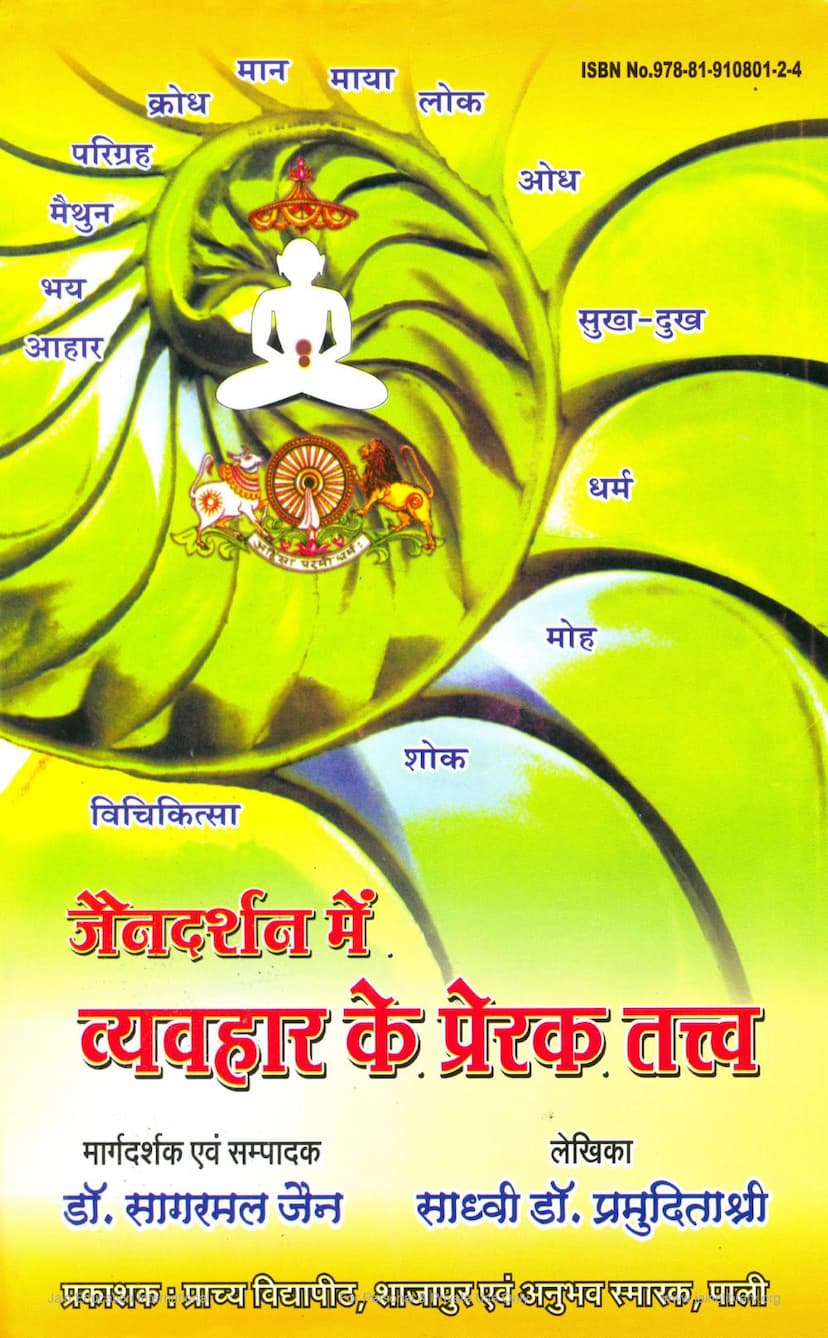Jain Darshan Me Vyavahar Ke Prerak Tattva
Added to library: September 1, 2025

Summary
This book, "Jain Darshan me Vyavahar ke Prerak Tattva" (The Motivating Principles of Behavior in Jain Philosophy), authored by Sadhvi Dr. Pramuditashreeji, offers a comprehensive exploration of the concept of 'Sanjna' (often translated as instinct, consciousness, or cognitive inclination) within Jain philosophy. The work is published by Prachya Vidyapith Shajapur and was compiled in 2013.
The book delves into the foundational principles of Jain behavior, explaining how various 'Sanjnas' act as internal drivers for actions. It systematically analyzes sixteen types of 'Sanjna' as outlined in Jain scriptures, providing a detailed examination of each. The author aims to connect these ancient Jain concepts with modern psychological understanding, particularly highlighting the parallels between Jain 'Sanjna' and Western psychological theories of instincts and emotions.
Key 'Sanjnas' discussed include:
- Ahar Sanjna (Food-seeking instinct): The innate drive for sustenance.
- Bhay Sanjna (Instinct of fear): The response to perceived danger and the instinct for self-preservation.
- Maithun Sanjna (Instinct of sex or sex drive): The drive related to procreation and desire, analyzed in comparison with Freud's concept of 'Libido'.
- Parigrah Sanjna (Instinct of appropriation): The tendency to possess, accumulate, and the inherent desire for ownership.
- Krodh Sanjna (Instinct of Anger): The analysis of anger as a motivating factor in behavior.
- Maan Sanjna (Instinct of Pride): The examination of ego, arrogance, and pride as behavioral drivers.
- Maya Sanjna (Instinct of Deceit): The exploration of deception, cunning, and hypocrisy as behavioral influences.
- Lobh Sanjna (Instinct of Greed): The analysis of desire, avarice, and the relentless pursuit of more.
- Lok Sanjna (Worldly enjoyment/Common sense): The influence of societal norms and trends on behavior.
- Ogh Sanjna (General inclination/Following the crowd): The tendency to follow the majority or ingrained habits, analyzed in comparison with natural instincts.
- Sukh Sanjna (Instinct of Pleasure): The pursuit of happiness and comfort.
- Dukh Sanjna (Instinct of Pain): The innate aversion to suffering and the drive to avoid it.
- Moh Sanjna (Instinct of Delusion): The attachment and infatuation that clouds judgment.
- Shok Sanjna (Instinct of Sorrow): The response to loss and grief.
- Vichikitsa Sanjna (Instinct of Disgust/Disgust): The aversion towards certain things, often considered necessary for self-preservation or hygiene, but also potentially leading to judgment.
- Dharm Sanjna (Instinct of Religion): The inherent inclination towards righteous conduct, ethics, and spiritual pursuit, analyzed as a higher form of consciousness or behavior.
The book meticulously breaks down the origins and manifestations of these 'Sanjnas', drawing parallels with modern psychology where applicable. It also discusses the impact of karma on the intensity and expression of these 'Sanjnas' and outlines Jain philosophical perspectives on how to manage, control, and ultimately transcend these behavioral drivers through practices like self-control, ethical conduct, and spiritual discipline, with the ultimate goal of achieving liberation (Moksha).
The author, Sadhvi Dr. Pramuditashreeji, guided by Dr. Sagarmal Jain, presents a scholarly yet accessible study, aiming to provide readers with a deep understanding of the intricate workings of human behavior from a Jain philosophical standpoint and its relevance to achieving spiritual progress. The book is a valuable resource for those seeking to understand the behavioral motivations from a Jain perspective and its application in leading a virtuous and purposeful life.